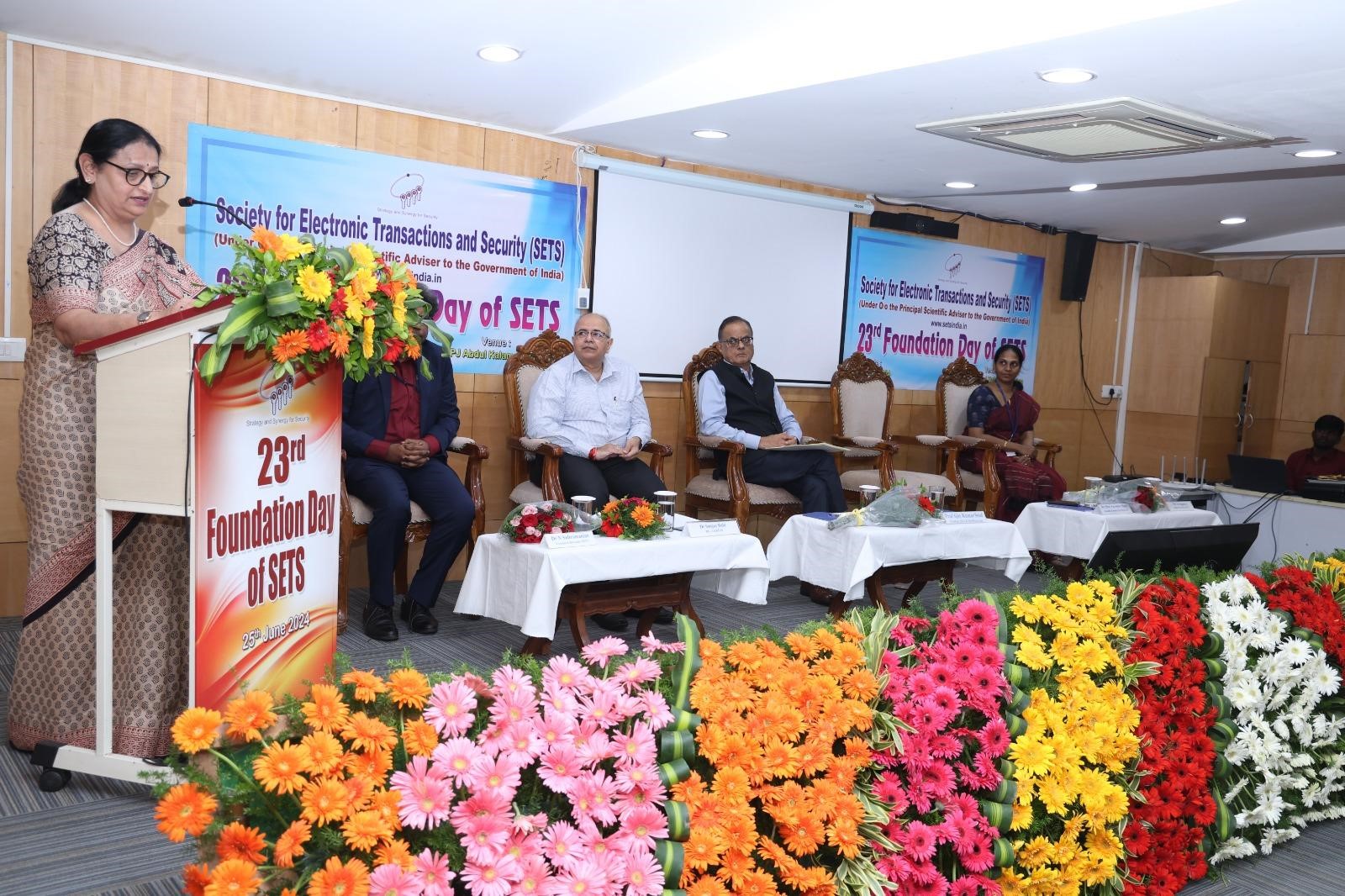Chennai: Professor Ajay Kumar Sood, Principal Scientific Adviser to the Government of India, and Dr. Parvinder Maini, Scientific Secretary, attended the 23rd Foundation Day of the Society for Electronic Transactions and Security (SETS) in Chennai today. Prof. Sood also inaugurated the Quantum Security Research Lab during the event.
Conceived by Dr. A.P.J. Abdul Kalam in 2002, SETS is an initiative of the Office of the Principal Scientific Adviser to the Government of India. It is a cybersecurity R&D organization dedicated to research in core areas such as cyber security, cryptology, hardware security, quantum security, and network security.
The celebration commenced with Dr. N Subramanian, Executive Director of SETS, extending a warm welcome and providing an overview of SETS’ research and development activities. He highlighted SETS’ advancements in developing futuristic solutions like Post Quantum VPN, Quantum Random Number Generator (QRNG), Key Distillation Engine (KDE) for Quantum Key Distribution, PKI solution, Ransomware Early Detection Solution, and Security for Blockchain. SETS collaborates with academic institutions like IITs and IISc Bangalore, government agencies, national R&D organizations, and user agencies such as the Department of Atomic Energy (DAE) and the Defence Research and Development Organisation (DRDO).
Delivering the presidential address, Prof. Sood congratulated SETS for its efforts in developing and deploying indigenous cybersecurity solutions in cryptography, secure quantum communication, hardware security, and network security. He commended SETS’ success in translating lab research into practical applications, including VPNs for the strategic sector and the QRNG solution for industry and strategic agencies.
Prof. Sood encouraged SETS to leverage its expertise to lead national efforts in Post Quantum Cryptography and to deepen collaborations with industry, R&D labs, and academia to ensure the nation’s computing and communication infrastructure remains quantum-safe. He emphasized scaling up successful projects like hardware security testing and post-quantum cryptography.
In her special address, Scientific Secretary Dr. Maini praised the scientists and staff of SETS for their significant contributions. She stressed the importance of continuously upgrading cybersecurity measures to address new vulnerabilities and dynamic threat landscapes, citing recent cyber threat incidents. Dr. Maini recognized recent enhancements in SETS’ infrastructure as crucial for tackling upcoming cybersecurity challenges and developing robust solutions.
Dr. Sanjay Bahl, Director General of the Indian Computer Emergency Response Team, Ministry of Electronics and Information Technology (MeitY), addressed evolving cybersecurity concerns in the context of AI, IoT proliferation, and drones. He urged SETS to develop a roadmap to address these challenges and innovate solutions.
Following his address, Prof. Sood inaugurated the Quantum Security Research Lab at SETS. He appreciated the demonstrations by the SETS team on QRNG, post-quantum implementation in Arm-Cortex, True Random Number Generator (TRNG), and KDE. The team also demonstrated the Metro Area Quantum Access Network (MAQAN), a joint project by SETS, IIT Madras, and the Centre for Development of Advanced Computing (C-DAC).
The Foundation Day celebration also featured Technology Sessions hosted by SETS scientists, providing a deep dive into topics such as post-quantum cryptography, side-channel analysis & hardware security, quantum communication security, security for blockchain, and network & IoT security.
The event was attended by representatives from various agencies, including the National Informatics Centre, Standardisation Testing and Quality Certification (STQC) Directorate, DRDO, Military College of Telecommunication Engineering (MCTE), Ministry of Home Affairs (MHA), Department of Telecommunications (DoT), Tamil Nadu e-Governance Agency (TNeGA), Unique Identification Authority of India (UIDAI), Controller of Certifying Authorities (CCA), Institute of Mathematical Sciences (IMSc), Chennai Mathematical Institute (CMI), IIT Madras, IISc Bangalore, C-DAC, along with industry representatives and startups.





